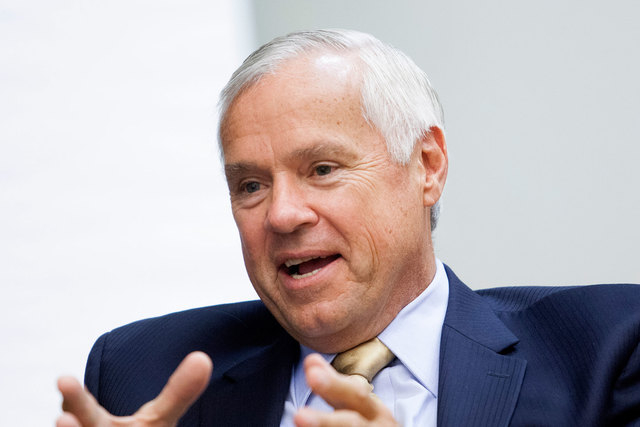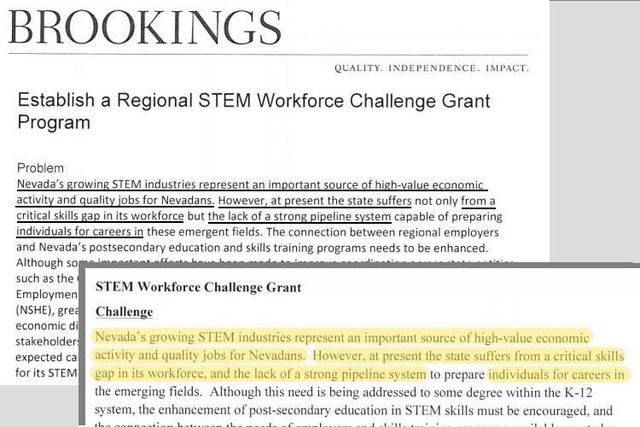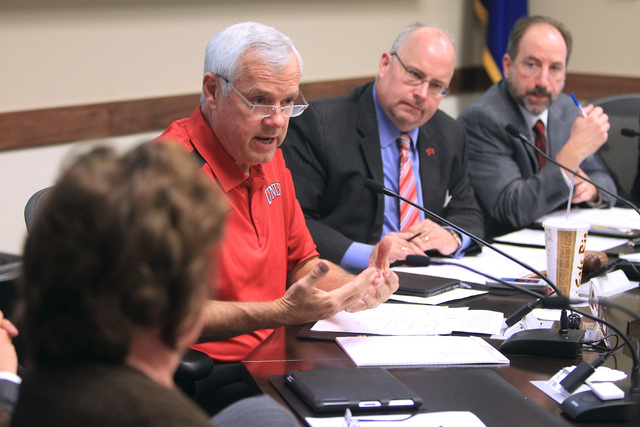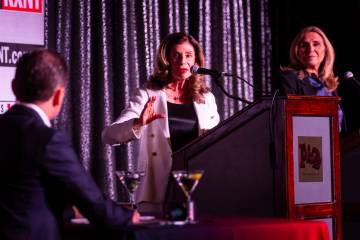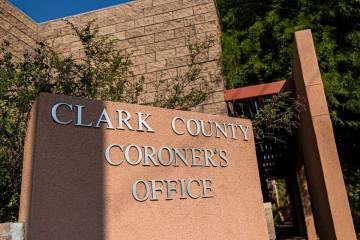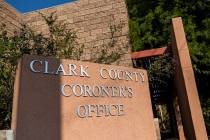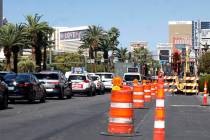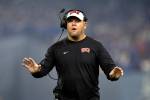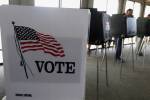Regents’ reaction to Nevada plagiarism scandal mixed
In the aftermath of allegations that the agency charged with overseeing higher education in Nevada plagiarized parts of a think tank’s report, one question is pervasive.
What happens next?
That’s up to the state board of regents, who have mixed opinions on the issue. The 13 elected regents, in charge of governing higher education in the state, may take the issue up at their Jan. 23 meeting and there’s been talk of an investigation. Some regents are troubled by the allegations, while others feel the controversy is overblown.
The chancellor, Dan Klaich, has come under particular fire during the controversy over the use of parts of a Brookings Mountain West report concerning a multi-million-dollar grant program designed to improve the workforce in “STEM” industries: science, technology, engineering and math.
Klaich has given explanations contradicted by his own emails, researchers at Brookings, and Frank Woodbeck, the executive director within the Nevada System of Higher Education who copied and presented parts of the report to an interim legislative committee in June without attribution.
Some students and faculty were particularly upset at Klaich’s argument that the plagiarism allegation was completely off base because, “You don’t plagiarize when you identify the author.”
The final version of the agency’s report, completed after Brookings requested to be credited, included a note that the report was based on a framework provided by Brookings.
It’s common knowledge that when copying large sections of language one should use quotation marks. In addition to the plagiarism accusation, the scandal has also been called intellectual property theft and a basic violation of the trust that is essential for vetting academic research. The Brookings report that was copied was an early draft that had been sent out for feedback with a label saying “do not circulate.” Brookings rolled out its final version in November.
Outgoing regent and incoming state controller Ron Knecht demanded an investigation so that those “falsely accused” could be exonerated. Knecht added that he anticipated in the end Brookings would look bad.
This attitude upset some regents. Incoming regent Trevor Hayes said he was all for an investigation, but against the idea that its purpose would be to protect the system’s people.
“Let’s dig into this so we can find out what happened,” Hayes said.“If it did happen, I am very concerned about how it happened. I don’t think it’s right. The fact that we’re involved in education makes it even more disturbing.”
Others’ opinions were more in line with Knecht.
“I think it’s been made a much bigger issue than it needs to be. I’m not sure why Brookings has approached this the way it has,” Regent Michael Wixom said. “I don’t view it as plagiarism. I think both Dan and Frank have said they probably could have approached it better. Should (they) have cited it differently? I think perhaps they should. They both acknowledged that.”
Wixom said the regents had other issues to worry about.
“I’ve known Dan for the better part of 10 years and I trust Dan,” Wixom said. “In my view he’s just done a stellar job as chancellor.”
Regent Jason Geddes said he didn’t think it was plagiarism, either.
“It’s not a published document. It’s not a federal grant that is being applied for. It was a recommendation to an interim committee of the Legislature,” Geddes said.
But Alex Murdock, a UNLV senior and former student government senator, was especially concerned last week that the plagiarism allegation involved a bill draft request, as he viewed sending something to the Legislature as very serious.
Regent Mark Doubrava said he was troubled by conflicting accounts of the issue. Doubrava said it was crucial that the standards students and faculty are expected to adhere to be applied to the entire system, including administrators.
Regent Rick Trachok said he needed to see all the facts before giving an opinion, but he was concerned.
Geddes said if it turned out Klaich had lied to the regents, the situation would need to be handled similarly to how the system treated a UNLV professor who was fired for serial plagiarism in November. Geddes, though, did not think Klaich had been dishonest. Geddes pointed out that Klaich’s email to the regents about the issue said the lead author of the Brookings’ report, Mark Muro, had reviewed Klaich’s statement about the events.
Klaich told the regents in an email that Muro, Washington director of Brookings Mountain West, agreed the agency could present Brookings’ work to the committee and asked NSHE to “fuzz it up” and remove the Brookings’ name.
Klaich’s email copied Muro and thanked him for being available to review his explanation. Muro told the Review-Journal on Dec. 11 he was surprised to see Brookings’ work in a public proposal by the agency. Muro said Friday he didn’t want to comment further on the issue.
The idea that Brookings would give unfinished work to a state agency, ask that the language be blurred and the Brookings name be removed offended Robert Lang, who as director of Brookings Mountain West published and funded the report and would have needed to approve any use of it.
“It’s not Brookings Mountain West policy to send underdeveloped and half-baked ideas to state agencies and ask that they blur or fuzz up the findings,” Lang said Dec. 15. “That is hardly the making of good public policy and would not reflect well on Brookings Mountain West or UNLV.”
Brookings Mountain West estimates their entire proposal, of which the report in question was a small part, cost $200,000. Brookings’ idea will now compete at the Legislature with NSHE’s copied version of Brookings’ early draft.



